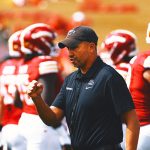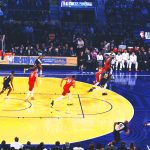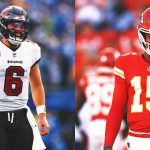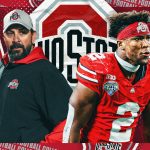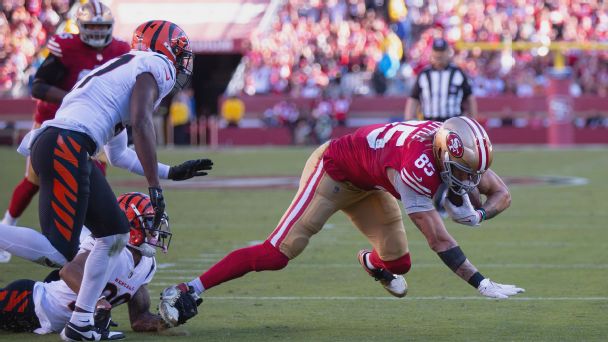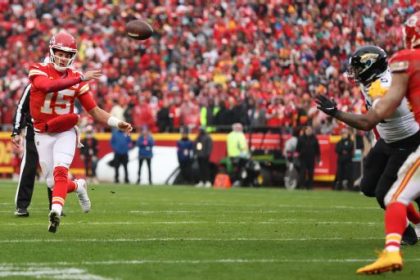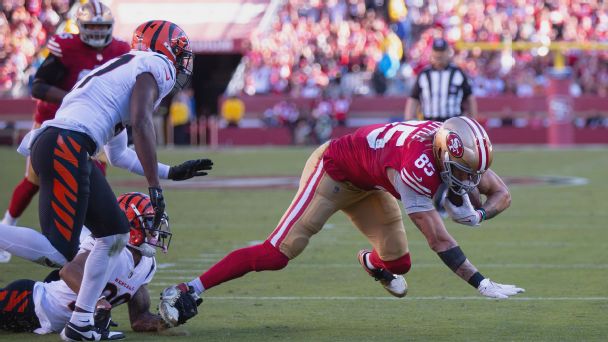
SANTA CLARA, Calif. — For the first five weeks of the season, the San Francisco 49ers looked like a juggernaut destined to make another deep postseason run.
The Niners walloped the teams they should and then, in case anyone thought it was a fluke based on a light schedule, demolished the Dallas Cowboys on national television in Week 5.
All of which makes where the Niners now sit — 5-3 with a three-game losing streak — as they enter their bye all the more confounding and alarming.
“I thought there was things that we were sloppy on versus Cleveland, mainly the penalties and struggling against the run,” coach Kyle Shanahan said. “I thought in Minnesota there was actually a number of good clips that I really liked how we looked on tape and our energy and stuff like that. But I thought we gave up too big of plays, a couple busts, and we struggled against a quarterback who was really hot.
“Then I believe [Sunday vs. Cincinnati] what to me sticks out on the tape the most is just how slow and tired we looked … I could see on tape a different type of energy that was disappointing. But I also know that they need this rest and that showed the most.”
Indeed, the Niners have looked like a completely different team over the past three weeks. The problems aren’t limited to any player or side of the ball. Some appear to be quick fixes. Others might take more time.
Either way, the 49ers entered this season as a team with three NFC Championship game appearances in the past four seasons and the clock ticking on their window to finally break through and win a Super Bowl. So there isn’t time to sit around wishing and hoping that things are going to magically get better, which is at least partially why the Niners traded a 2024 third-round pick for defensive end Chase Young on Tuesday.
We’ll take a look at the problems that the 49ers have faced in their recent losing streak and how solvable each of them are, through trades or other means.
Injuries
One thing the Niners hope the bye week can definitely help solve is their health. San Francisco had been mostly healthy through five weeks until it lost All-Pro left tackle Trent Williams (sprained right ankle), receiver Deebo Samuel (hairline fracture in his shoulder) and running back Christian McCaffrey (oblique strain) in a Week 6 loss to the Browns.
While McCaffrey has been able to play through it the past two weeks, Samuel and Williams missed each of the past two games. Their absence has been felt in multiple ways.
Shanahan is optimistic both could return after the bye. The Niners could use both players back as soon as possible, especially since they can play key roles in igniting the Niners’ ailing run game through Williams’ blocking and Samuel’s versatility.
Through the first five weeks, the Niners averaged 34.6 carries per game for 156.4 rushing yards on 4.5 yards per attempt. Over the past three, those numbers have dropped to 23.3 carries for 95.3 yards on 4.1 yards per carry.
Getting the run game revved back up will be a top priority coming out of the bye, especially given all the other things it can set up in Shanahan’s playbook.
“When you have outside zone, you could run play action, boot legs, keepers, all that off of it,” tight end George Kittle said. “And when you have turnovers and you have penalties playing behind the sticks, playing down, it’s hard to run the football and get access to all those plays. We need to be cleaner up front early on. Then we continue to run the football, run outside zone, run some gap scheme and be the physical 49ers offense that we know and love.”
Turnovers
The trickle-down effect that Kittle mentioned is that a Niners team that was regularly playing with big leads is now finding itself in more difficult second-half conditions where young quarterback Brock Purdy is asked to pull off big comebacks when the defense knows exactly what’s coming.
That has contributed to perhaps the most concerning issue of the 49ers’ recent downturn: turnovers. The Niners had just two giveaways and zero interceptions during their five-game win streak. They have seven giveaways and five interceptions in the past three. What’s more, four of those interceptions have come in opponents’ territory.
By and large Purdy has played well this season, but he still has to prove he can deliver in suboptimal situations with the game on the line.
“It’s like, trust in the play, trust in what we’re trying to do,” Purdy said. “And then if it’s not there, try to make something happen but don’t force it … Even when you’re trying to make something happen, be smart with it as well. So, definitely a fine line to it.”
1:13
Stephen A.: Brock Purdy is a huge problem for the 49ers
Stephen A. Smith breaks down why he doesn’t like what he’s seeing from Brock Purdy.
Tackling
Defensively, the 49ers’ issues are even more wide-ranging. There always figured to be some hiccups under new coordinator Steve Wilks, but the first five weeks seemed to put those concerns at ease before a significant regression over the past three.
The most surprising part of it has been the Niners’ sudden inability to tackle consistently. Sound tackling has been a hallmark of every good Niners defense in recent years and looked to be again this season, when they had just 24 missed tackles in the first five games. Over the past three weeks, they’ve missed 32, including a season-high 13 on Sunday against the Bengals.
Those missed tackles have turned short gains into chunk plays. In the first five games, the Niners were allowing an average of 49.4 yards after first contact per game, which was second best in the league, and had only given up 10 plays of 20-plus yards, the fewest in the NFL. Those numbers have jumped to 100.7 yards after contact per game and 15 plays of 20-plus yards allowed, both of which rank 31st. A run defense that was best in the NFL in 2022 is giving up 122.7 yards and 4.5 yards per carry, ranking 24th and 27th, respectively, over the past three weeks.
In theory, this should be an easy fix, since the Niners have the same players who did so well to open the season, but they still have to prove they can tackle well over the long haul.
“I’m not going to make excuses for why we’re missing tackles,” linebacker Fred Warner said. “We’ve got to tackle better.”
Coverage/Pass rush
Perhaps the tackling issues the 49ers have faced would be improved by better pass coverage. Wilks arrived in San Francisco with an aggressive reputation. In previous stops, Wilks often paired man coverage with high blitz rates. The Niners have done the opposite in most of their seven seasons under Shanahan, rushing with four and mixing up zone coverages.
The splits under Wilks aren’t markedly different from what the Niners did before his arrival but it’s clear that the Niners are struggling to tie their coverage to their pass rush in a way that gives the pass rush time to get home. The 49ers have just five sacks and 30 pressures over the past three weeks.
That’s not enough given their continued level of investment in the defensive line, and their hope is adding Young can help in that regard. All of that has Shanahan already fielding question about his confidence in Wilks. That includes discussions on moving Wilks from the booth to the sideline in hopes it can help spark the defense.
In reality, moves such as that are mostly cosmetic, the type of thing that can be done as evidence of trying things rather than taking meaningful steps to get better. The Niners’ improvement must come from getting back to the basics. Shanahan’s parting message to his team before the bye drove that point home.
“Bottom line was we’ve got to get better in every aspect,” Shanahan said.

